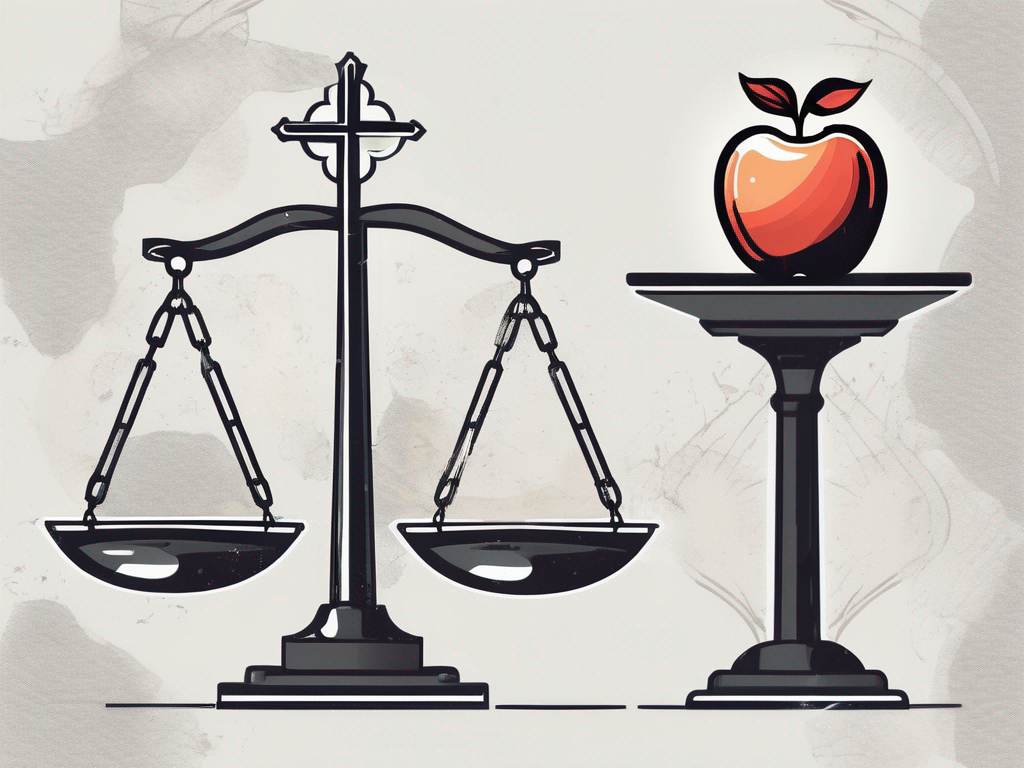Predestination is a fascinating and often perplexing concept that has been the subject of much debate and controversy throughout Christian history. In this article, we will explore what the Bible says about predestination, as well as the different theological perspectives and debates surrounding it. We will also delve into the impact of predestination on the Christian life and faith, and discuss how it can be reconciled with the notions of God’s love and justice.
Understanding the Concept of Predestination
Before we dive into the biblical references and theological discussions, let’s first understand what predestination means in a biblical context. Simply put, predestination refers to the belief that God has chosen and determined the eternal destiny of individuals even before they are born. This means that God has foreordained some people to be saved and others to be damned.
However, it’s important to note that predestination does not imply that humans do not have free will or that their choices and actions have no impact on their salvation. Rather, predestination is viewed as part of God’s overarching plan for salvation and the divine initiative in initiating a relationship with His creation.
When we explore the concept of predestination, we find that it raises many questions and sparks intense theological debates. People have wrestled with the tension between God’s sovereignty and human responsibility, trying to understand how these two concepts coexist. Let’s delve deeper into the biblical foundations and theological perspectives on predestination to gain a comprehensive understanding.
Defining Predestination in a Biblical Context
In the Bible, the concept of predestination is primarily found in the writings of the Apostle Paul, particularly in his letters to the Romans and the Ephesians. For example, in Romans 8:29-30, Paul writes, “For those whom he foreknew he also predestined to be conformed to the image of his Son… And those whom he predestined, he also called; and those whom he called, he also justified.” These verses suggest that God’s choice and predestination of individuals is based on His foreknowledge and plan to conform them to the likeness of Christ.
Similarly, in Ephesians 1:4-5, Paul states, “He chose us in him before the foundation of the world… In love he predestined us for adoption to himself as sons through Jesus Christ.” Here, predestination is closely tied to God’s love and His purpose of adopting believers as His children.
As we explore these biblical passages, we see that predestination is intricately connected to God’s foreknowledge, His plan for salvation, and His desire to transform believers into the image of Christ. It is not a random selection, but a purposeful and intentional act of God.
Theological Perspectives on Predestination
Throughout history, theologians have offered various perspectives on the concept of predestination. One prominent view is Calvinism, which is named after the theologian John Calvin. Calvinism holds to the belief in unconditional election, meaning that God’s choice and predestination of individuals for salvation is completely independent of any merit or deserving on their part.
On the other hand, Arminianism, influenced by the teachings of the Dutch theologian Jacobus Arminius, emphasizes human free will and God’s desire for the salvation of all people. According to Arminianism, God’s predestination is based on His foreknowledge of individuals’ response to His offer of salvation.
These theological perspectives have sparked vigorous debates and discussions among scholars and believers alike. The tension between God’s sovereignty and human responsibility continues to be explored and contemplated, with different interpretations and understandings emerging.
It is important to approach the topic of predestination with humility and an openness to different viewpoints. While we may not have all the answers, the exploration of predestination invites us to delve deeper into the mysteries of God’s plan and His relationship with humanity.
Biblical References to Predestination
Predestination in the Old Testament
While the term “predestination” is not explicitly used in the Old Testament, there are passages that hint at God’s sovereign choice and foreordination of individuals. These passages provide a glimpse into the intricate workings of God’s plan for His people.
One such example can be found in Jeremiah 1:5, where the prophet declares, “Before I formed you in the womb I knew you, and before you were born I consecrated you; I appointed you a prophet to the nations.” This powerful verse reveals that God had a specific purpose for Jeremiah even before he was born. It showcases the depth of God’s knowledge and His ability to set apart individuals for His divine plans.
Another remarkable instance is found in Isaiah 45:4, where God speaks, saying, “For the sake of my servant Jacob, and Israel my chosen, I call you by your name, I name you, though you do not know me.” This verse highlights God’s choice and naming of Israel as His chosen people. It demonstrates His intentional selection of a specific group to fulfill His purposes and bring about His redemptive plan for humanity.
These passages from the Old Testament provide a foundation for understanding the concept of predestination, as they reveal glimpses of God’s sovereign will and His divine orchestration of events.
Predestination in the New Testament
In the New Testament, we find more direct references to predestination, particularly in the writings of the Apostle Paul. Paul’s letters serve as a theological exploration of God’s plan for salvation and the role of predestination within it.
As previously mentioned, Paul emphasizes God’s predestination in his letters to the Romans and the Ephesians. In Romans 8:29-30, Paul writes, “For those whom he foreknew he also predestined to be conformed to the image of his Son, in order that he might be the firstborn among many brothers. And those whom he predestined he also called, and those whom he called he also justified, and those whom he justified he also glorified.” These verses reveal the interconnectedness of God’s foreknowledge, predestination, calling, justification, and glorification. They highlight the comprehensive nature of God’s plan, encompassing every aspect of salvation.
Another notable passage is Ephesians 2:10, where Paul states that believers are “created in Christ Jesus for good works, which God prepared beforehand, that we should walk in them.” This verse suggests that God had already planned and ordained good works for believers to engage in. It underscores the purposeful nature of predestination, as God not only chooses individuals but also equips them for specific tasks and assignments.
Furthermore, predestination is mentioned in 1 Peter 1:1-2, where the apostle addresses his letter to “those who are elect exiles of the dispersion.” Peter further affirms that believers have been “chosen according to the foreknowledge of God the Father.” This verse highlights God’s foreknowledge as a determining factor in His choice and predestination of individuals. It emphasizes that God’s selection is not arbitrary but based on His perfect knowledge and wisdom.
These New Testament passages deepen our understanding of predestination, revealing its significance in God’s plan for salvation and the purposeful nature of His choice. They invite us to contemplate the mystery of God’s sovereignty and the intricate ways in which He works in the lives of His people.
Debates and Controversies Surrounding Predestination
Calvinism and Predestination
Calvinism, as a theological system, places a strong emphasis on the doctrine of predestination. According to Calvinists, God’s choice and predestination are sovereign acts that are not influenced or dependent on human actions or choices.
Calvinists believe that God, in His infinite wisdom, has chosen certain individuals for salvation and eternal life before the foundation of the world. This view is based on passages from the Bible, such as Ephesians 1:4-5, which states, “For he chose us in him before the creation of the world to be holy and blameless in his sight. In love he predestined us for adoption to sonship through Jesus Christ, in accordance with his pleasure and will.”
While some argue that Calvinism’s view of predestination undermines human free will and responsibility, Calvinists maintain that God’s sovereignty does not negate the reality of human choice and accountability. They believe that God’s predestination works in harmony with human free will, as individuals willingly respond to God’s call and choose to follow Him.
Calvinists also emphasize that God’s predestination is not arbitrary or unjust. They believe that God’s choice is based on His perfect knowledge and understanding of all things, including the future. Therefore, His predestination is just and fair, even if it may seem mysterious and beyond human comprehension.
Arminianism and Free Will
In contrast to Calvinism, Arminianism emphasizes the importance of human free will in salvation. Arminians believe that God’s predestination is based on His foreknowledge of individuals’ response to His offer of salvation.
Arminians argue that God, in His love and mercy, offers salvation to all people and desires that everyone would come to repentance and faith. They believe that God’s predestination is not a predetermined selection of individuals for salvation, but rather a divine knowledge of who will freely choose to accept His offer of grace.
Arminians contend that this view preserves human responsibility and ensures that salvation is available to all, not limited to a predetermined few. They believe that God’s grace is resistible, meaning that individuals can choose to accept or reject His offer of salvation.
However, critics argue that Arminianism may underestimate the role of God’s sovereign grace in salvation. They contend that if salvation ultimately depends on human choice, then it becomes a work of human effort rather than a result of God’s unmerited favor. Critics also question how God’s foreknowledge of human choices does not infringe upon human free will.
Despite the debates and controversies surrounding predestination, both Calvinists and Arminians share a common belief in the importance of faith in Jesus Christ for salvation. They may differ in their understanding of how God’s sovereignty and human free will interact, but both affirm the centrality of Christ’s atoning sacrifice and the need for personal faith and repentance.
Impact of Predestination on Christian Life and Faith
Predestination and Personal Faith
For individuals grappling with the concept of predestination, it can raise questions about the nature of personal faith and the assurance of salvation. Some may wonder if they are among the chosen or if their faith is genuine.
However, many theologians assert that predestination should not be a source of anxiety, but rather a source of comfort and assurance. It is a reminder that salvation is ultimately a work of God’s grace, and that our trust should be placed in His unfailing love and faithfulness.
Predestination and Church Doctrine
Predestination has played a significant role in shaping various church doctrines and traditions throughout history. It has impacted views on salvation, election, and the nature of God’s sovereignty.
However, despite differences in interpretation, many Christians agree that the primary focus should be on the person and work of Jesus Christ, who is the cornerstone of salvation and the ultimate expression of God’s love for humanity.
Reconciling Predestination with God’s Love and Justice
The Paradox of Divine Sovereignty and Human Free Will
One of the challenges in understanding predestination lies in reconciling the concepts of divine sovereignty and human free will. On one hand, predestination emphasizes God’s sovereignty in choosing and predestining individuals for salvation. On the other hand, human free will implies individuals’ ability to choose or reject God’s offer of salvation.
While it may be tempting to seek complete resolution to this paradox, many theologians affirm that it is ultimately a mystery that surpasses human understanding. Instead of getting caught up in the intricacies, the focus should be on living faithfully and trusting in the character of a loving and just God.
The Role of Grace in Predestination
Regardless of theological perspectives and debates, the concept of grace is central to the understanding of predestination. God’s predestination is an expression of His grace and His desire for intimate relationship with His creation.
Thus, while predestination remains a complex and multifaceted topic, it should ultimately remind us of the immeasurable love and mercy of our Heavenly Father, who reaches out to humanity with open arms, offering the gift of salvation to all who believe.
In conclusion, the concept of predestination is a profound and thought-provoking subject that has captured the attention of theologians and believers throughout the ages. While the Bible contains various references to predestination, it offers room for interpretation and invites us to engage in theological dialogue. Despite the debates and controversies surrounding predestination, it is essential to remember that our focus should always be on the character and love of God, who offers salvation to all through His abundant grace.












